Unit 4 Scientists Who Changed the World Extended Reading课件(共50张PPT)-2025-2026学年译林版(2020)必修第三册
文档属性
| 名称 | Unit 4 Scientists Who Changed the World Extended Reading课件(共50张PPT)-2025-2026学年译林版(2020)必修第三册 | 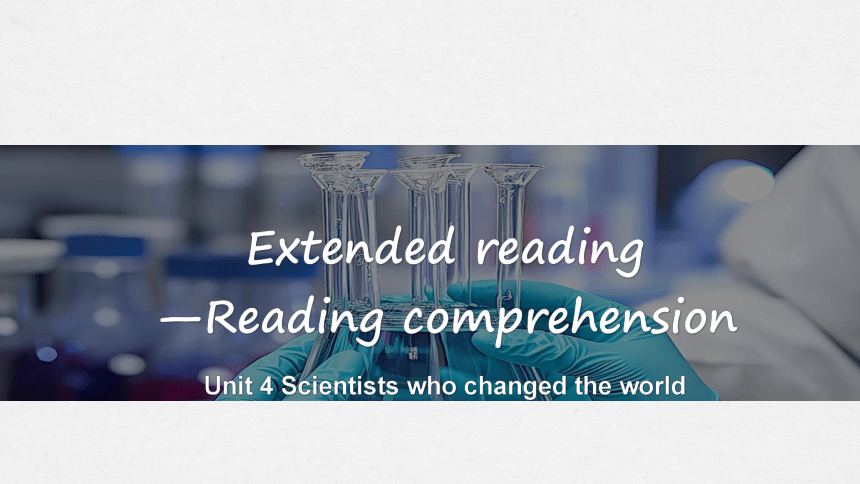 | |
| 格式 | pptx | ||
| 文件大小 | 62.8MB | ||
| 资源类型 | 教案 | ||
| 版本资源 | 牛津译林版(2019) | ||
| 科目 | 英语 | ||
| 更新时间 | 2025-07-18 19:43:56 | ||
图片预览

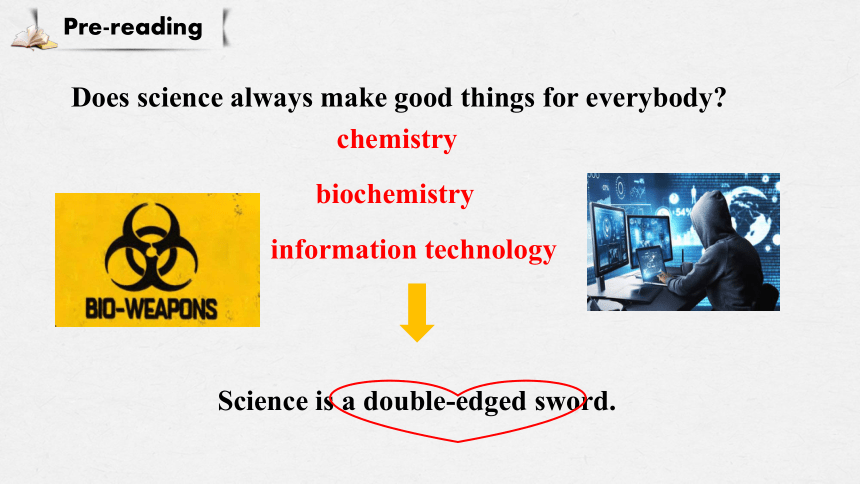
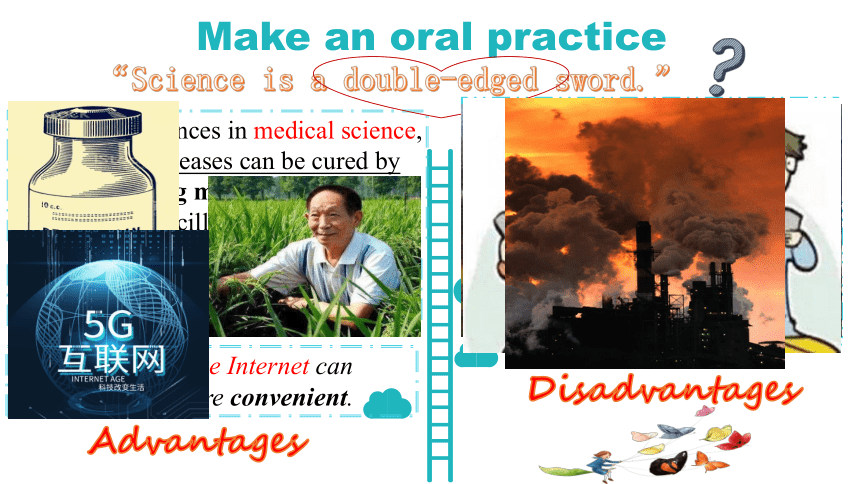

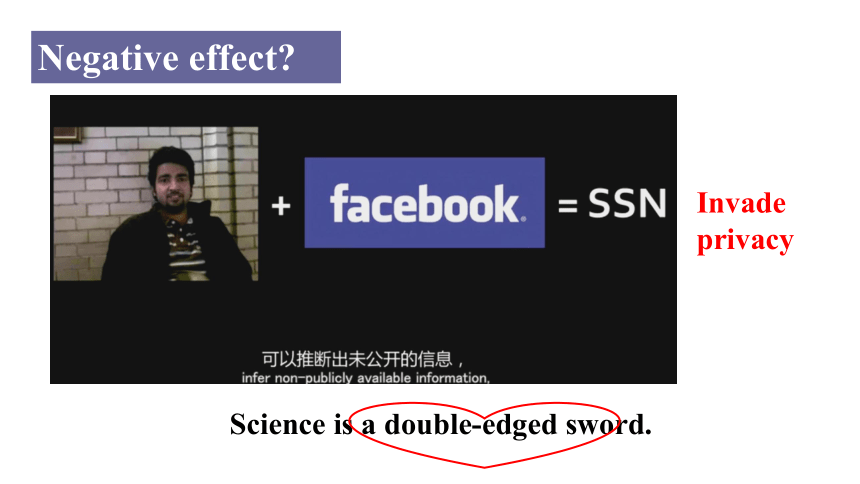
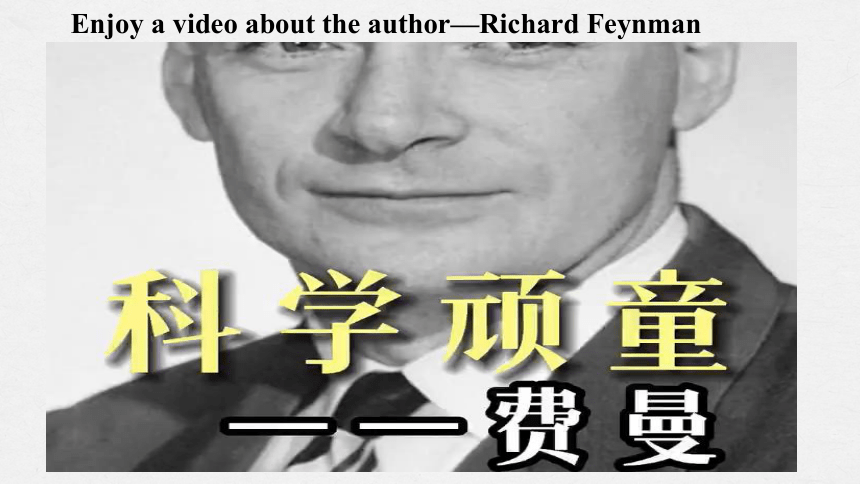
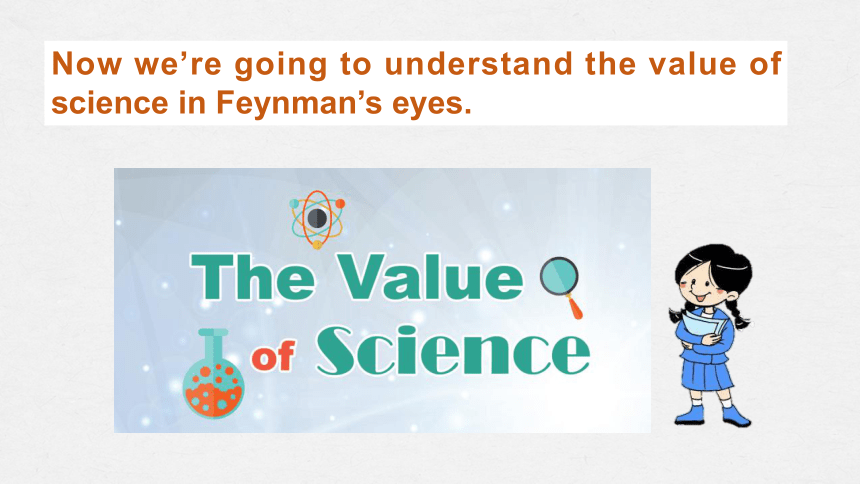
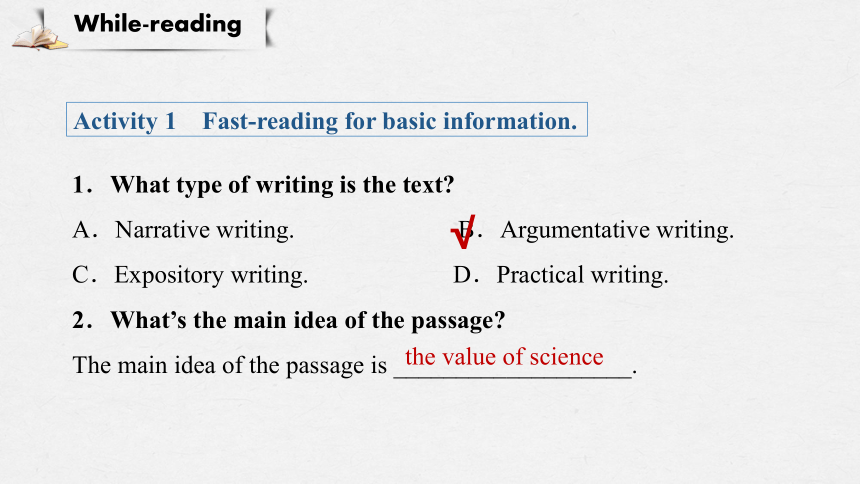
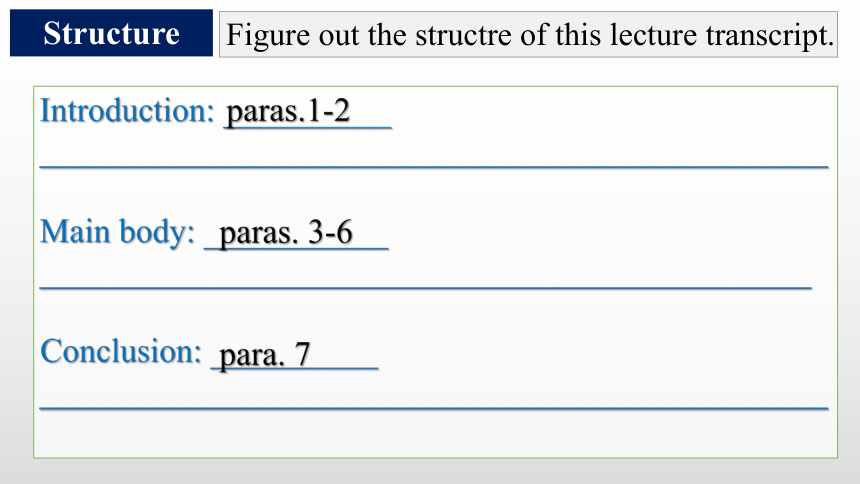
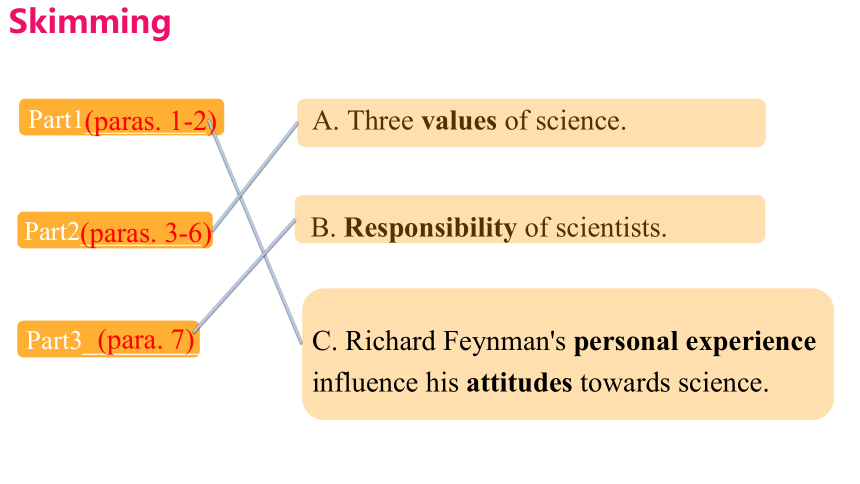
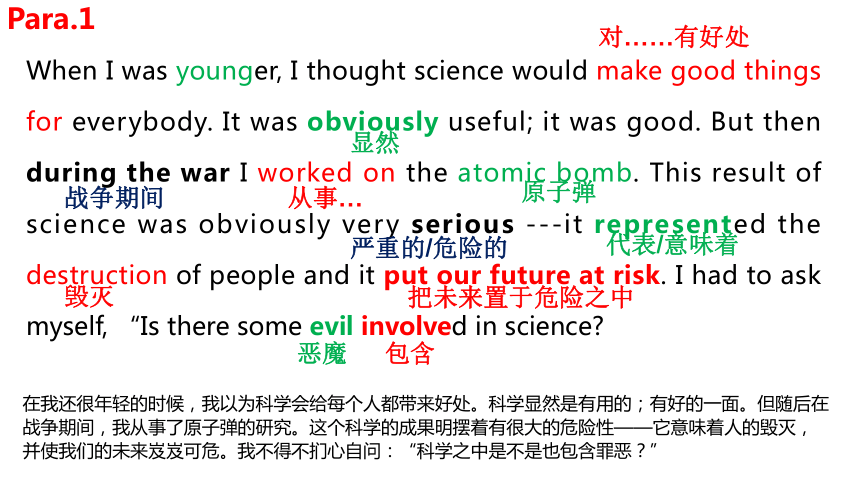
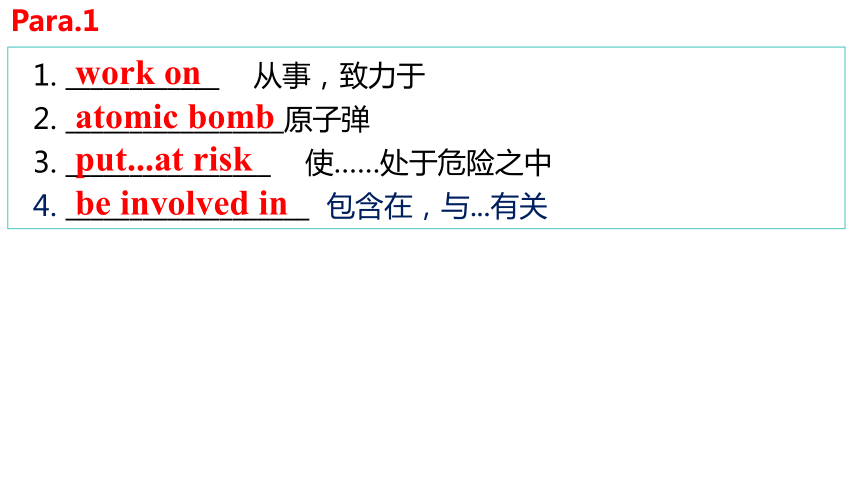
文档简介
(共50张PPT)
Extended reading
—Reading comprehension
Unit 4 Scientists who changed the world
Does science always make good things for everybody
chemistry
biochemistry
information technology
Science is a double-edged sword.
Pre-reading
Make an oral practice
Advantages
“Science is a double-edged sword.”
Due to the advances in medical science,
some deadly diseases can be cured by some life-saving medicine, such as qinghaosu, penicillin and so on.
Military science is often misused in wars, which cause countless deaths and injuries.
Disadvantages
The production of hybrid rice can ease the hunger problem.
The invention of the Internet can make our lives more convenient.
Being smartphone addicts is harmful to our real lives.
Industrialized society can damage the environment.
What is it
Facial recognition system
Function
Invade privacy
Negative effect
Science is a double-edged sword.
Enjoy a video about the author—Richard Feynman
Now we’re going to understand the value of science in Feynman’s eyes.
1.What type of writing is the text
A.Narrative writing. B.Argumentative writing.
C.Expository writing. D.Practical writing.
2.What’s the main idea of the passage
The main idea of the passage is ___________________.
Activity 1 Fast-reading for basic information.
While-reading
√
the value of science
Structure
Introduction: __________
_______________________________________________
Main body: ___________
______________________________________________
Conclusion: __________
_______________________________________________
Figure out the structre of this lecture transcript.
paras.1-2
paras. 3-6
para. 7
Skimming
Part1_________
Part2_________
Part3_________
C. Richard Feynman's personal experience influence his attitudes towards science.
A. Three values of science.
B. Responsibility of scientists.
(paras. 1-2)
(paras. 3-6)
(para. 7)
When I was younger, I thought science would make good things for everybody. It was obviously useful; it was good. But then during the war I worked on the atomic bomb. This result of science was obviously very serious ---it represented the destruction of people and it put our future at risk. I had to ask myself, “Is there some evil involved in science
在我还很年轻的时候,我以为科学会给每个人都带来好处。科学显然是有用的;有好的一面。但随后在战争期间,我从事了原子弹的研究。这个科学的成果明摆着有很大的危险性——它意味着人的毁灭,并使我们的未来岌岌可危。我不得不扪心自问:“科学之中是不是也包含罪恶?”
Para.1
对……有好处
显然
战争期间
从事…
原子弹
严重的/危险的
代表/意味着
毁灭
把未来置于危险之中
恶魔
包含
1. ____________ 从事,致力于
2. _________________原子弹
3. ________________ 使……处于危险之中
4. ___________________ 包含在,与...有关
work on
put...at risk
be involved in
atomic bomb
Para.1
Put another way, what is the value of the science I had devoted myself to—the thing I had loved — when I saw what terrible things it could do It was a question I had to answer. I thought long and hard about this question, and I will try to answer it in this talk.
换句话说,当我看到科学可能造成的恶果之后,我一直投身其中的科学——我曾经的挚爱,价值何在?这是一个我必须回答的问题。关于这个问题我苦思冥想了很久,我将尝试在这次演讲中给出解答。
Para.2
换句话说 in other words
致力于……
糟糕的/恶劣的
演讲
苦思冥想
1.________________ 换句话说
2._____________________________ 致力于……
3._____________________ 深思熟虑、再三思考
Para.2
put another way
devote oneself to (doing)...
think long and hard
Before the war
After the war
Making good things
Being useful
and good
Putting our future at risk
Serious and destructive results
The author’s internal confusion
(Paras. 1-2)
Angel
Devil
What is the value of science
1.How did the author introduce the topic
A. By asking a question. B. By making a comparison.
C. By giving an example. D. By quoting a famous saying.
2.What made the author change his attitude to science's value
A.His common sense. B.His research on science.
C.His knowledge about science. D.His experience during the war.
Introduction(Paras.1-2) Introducing the topic
Activity 2 Careful-reading for details
√
√
3. What’s the author’s attitude to science during the war
A.Positive. B.Negative. C.Neutral. D.Indifferent.
√
1.According to Feynman, who should be blamed if the power of science is used to do something bad
It is not the science, but the man misusing it that should be blamed.
Understanding
Details——the first value (Para. 3)
positive
Mixed
Negative
Scientific knowledge enables us to do and make all kinds of things.
The first way in which science is of value is familiar to everyone: scientific knowledge enables us to do and make all kinds of things. Of course, if we make good things, it is not only to the credit of science; it is also to the credit of the moral choice which led us to good work.
Para.3
科学体现价值的第一种方式是人人都耳熟能详的:科学知识能够让我们做各种各样的事,造不同种类的东西。当然,如果我们做了善事,这不仅归功于科学;还归功于引导我们行善的道德选择。
某物被某人所熟悉
科学的
使某人能够做…
使……值得赞扬
道德的
Scientific knowledge is an enabling power to do either good or bad — but it does not carry instructions on how to apply it. Such power has obvious value — even though the power may be negated by what one does with it.
Para.3
科学知识是一种让我们可以行善也可以作恶的力量——但该如何运用,它并没有自带说明书。这样的力量其价值显而易见——尽管这种力量可能会被人们的行为所否定。
力量
要么…要么…
说明书
运用/申请
明显的
尽管
否定
Para.3
1. ______________ 具有价值
2. ______________________ 某物被某人所熟悉
3. ____________________归功于……
4._________________________引导我们行善
be of value
sth. be familiar to sb.
lead us to good work
to the credit of...
Para.3 What do these “it” refer to
making good things
scientific knowledge
A. making good things B.an enabling power
C. scientific knowledge D. the first way
Another value of science is the intellectual enjoyment it can provide us with. When we look at any question deeply enough, we feel the excitement and mystery coming to us again and again. With more knowledge comes a deeper, more wonderful mystery, inspiring one to look deeper still.
Para.4
科学的另一个价值是它可以为我们提供的智力享受。当我们足够深入地看待任何问题时,我们就会一次又一次地感到兴奋和神秘。随新知而来的是更深刻、更精妙的奥妙,激励着我们更深入地去探究。
智力的享受
给某人提供…
神秘
激励某人去……
Never concerned that the answer may let us down, with pleasure and confidence we turn over each new stone to find unimagined strangeness leading on to more wonderful questions and mysteries. Thanks to the scientific efforts, we have been led to imagine all sorts of things more fantastic than poets and dreamers of the past ever could.
Para.4
我们从不担心答案可能会令人失望,总是带着愉悦和信心,我们翻开每一块新的石头,发现一些意想不到、稀奇古怪的东西,它们指向更加奇妙的问题和奥秘。多亏了科学付出的努力,我们在其引领下构想出形形色色的东西,远比过去任何一位诗人和梦想家的想象更加美妙。
担心
使……失望
翻开
意想不到的奇妙
多亏
想象
各种各样的
美妙的
1.What can lead to intellectual enjoyment
2. (Line 20-22) Feynman compares our experience of turning over each new stone to find mysteries to the experience of ______________________
Effort Result
look at any question deeply enough
feel the excitement and mystery
a deeper, more wonderful mystery
with more knowledge
analogy
Details——the second value (Para. 4)
1. ___________________________ 智力的享受 (L17)
2. ______________________ 给……提供……(L17)
3. ______________________________激励人们深入看问题(L20)
4.________________让某人失望(L21)
5.______________________________进行一次新的探索(L21)
6. ________________被引领做某事(L23)
intellectual enjoyment
Para.4
provide...with...
inspire one to look deeper
let sb down
turn over each new stone
be led to do
4. What does intellectual enjoyment include
Find out words or phrases positive in meaning.
5. What does “the intellectual enjoyment” mean according to Richard
A.Science is great fun and people take delight in learning science.
B.Science is complex and can help people become clever.
C.Science is unlimited and people get pleasure from making constant discoveries.
D.Science is developing and people enjoy the ever-changing scientific knowledge.
√
I would now like to turn to a third value that science has. The scientist has a lot of experience with ignorance and doubt and uncertainty, and this experience is of very great importance. When a scientist doesn't know the answer to a problem, he is ignorant. When he has an idea as to what the result is, he is uncertain. And when he is pretty sure of what the result is going to be, he is still in some doubt.
Para.5
现在我想谈谈科学拥有的第三个价值。科学家经常会经历无知、怀疑和不确定性,而这种经历非常重要。当一个科学家不知道某个问题的答案时,他是无知的。当他对于结果是什么有主意时,他是不确定的。当他非常确定结果会是什么时,他仍然有所疑问。
转向
无知
怀疑
不确定性
很重要
无知的
关于
不确定的
……的答案
非常确定
不肯定;有所怀疑
It’s never too late to learn.
ignorance
What can we learn from the third value of science
活到老,学到老
More knowledge, more doubt.
Para.5
1. _____________________________________________ 无知,怀疑和不确定 (L26)
2. ____________________________ 重要(L26)
3. _____________关于(L28)
4.________________不肯定,不确定(L29)
be in doubt
as to
ignorance and doubt and uncertainty
be of great importance
◎ Scientific knowledge enables us to do and make all kinds of things.
Values
◎ Science can provide us with intellectual enjoyment.
◎ Scientists have the freedom to doubt.
Part Ⅱ
The Value
of
Science
Now, we scientists take it for granted that it is perfectly possible to live and not know. But our freedom to doubt was born out of a deep and strong struggle against authority in the early days of science. In order to progress, we must not forget the importance of this struggle; we must recognize our ignorance and leave room for doubt. Permit us to question---to doubt---to not be sure.
Para.6
现在,我们科学家理所当然地认为,人类生而有所不知是很可能的。但是,我们怀疑的自由是脱胎于科学早期对抗权威的展开的一场深刻而强硬的斗争。为了取得进步,我们不能忘记这场斗争的重要性;我们必须认识到我们的无知,并为怀疑留出一席之地。请允许我们质疑---怀疑---不确定。
理所当然地认为
自由
脱胎于
权威
为了
认识到
为……留余地
允许某人做…
Read Para. 5-6 and find three steps about
scientists’ figuring out problems.
01
02
03
1. _________(adj.)
3. ________(adj.)
uncertain
problem
idea
doubtful
ignorant
2. _________(adj.)
result
Never stop the footsteps towards the truth.
Para.6
1. ______________________ 想当然地认为,认为……是理所当然的(L30)
2. ___________________ 因为……而成立(产生)(L31)
3. ___________________给……留空间(L35)
take it for granted
be born out of...
leave room for...
It is our responsibility as scientists, knowing the great progress that is the fruit of freedom of thought, to declare the value of this freedom; to teach how doubt is not to be feared but to be welcomed and discussed; and to demand this freedom as our duty to all coming generations.
作为科学家,我们知道巨大进步源于思想自由,我们有责任宣布这种自由的价值;有责任教导人们不必害怕质疑,而是欢迎疑惑并讨论质疑;并要求这种自由作为我们对所有后代的责任。
Para.7
责任
进步
阐明
不是… 而是…
要求
后代
可怕的
……的成果
Para.7
1. ______________________ ……的成果,成效,结果(L37)
2. ___________________ 不是……而是……(L38)
the fruit/fruits of...
not...but...
1. What are the duties of scientists
To declare the value of the freedom to doubt.
To teach how doubt is not to be feared but to be welcomed and discussed.
To demand this freedom to all coming generations.
Parallelism
Conclusion(Para.7)
2.What can we infer from the passage
A.Everything has two sides.
B.All is progressing.
C.Authority is science.
D.Science can change everything.
√
3.What is the purpose of the text
A.To comfort worried people.
B.To show the author’s excellent talents to people.
C.To respect famous scientists.
D.To tell people the importance of science.
√
1.Feynman believes that of all science’s many values, the greatest must be the freedom to doubt. How do you understand this?(Critical thinking)
Doubt is the key to knowledge. We shouldn’t take anything for granted. With doubt and curiosity, we keep a fresh mind to our surroundings.
Activity 1 Discussion
Post-reading
Feynman believes that, the greatest science’s values is the freedom to doubt. How do you understand this
Reflection
Say “No” to everything
Through doubting,what can we achieve
Through doubting, we are eager to explore the unknown, so that we can get progress.
While maybe the sheer (完全的) distance from my native country alone can sometimes seem overwhelming, experiencing small waves of culture shock reminds me that I am exploring different parts of the world and that I should appreciate what I’m taking in.
How to properly question(质疑)
advisable(可取的)
inadvisable(不可取的)
Critical thinking(批判性思维)
dare to question
challenge the authority
. . .
blindly doubt
show no respect for others
. . .
Deep thinking
Besides doubt , what other qualities do they have during the perocess of promoting the development of science
1.________________ 从事,致力于
2.________________ 使……处于危险之中
3.________________ 换句话说
4.________________ 致力于……
5.________________ 归功于……
6.________________ 给……提供……
7.________________ 使某人失望
8.______________________ 进行一次新的探索
9.________________ 促使,促成
10.________________ 关于,至于
11.________________ 不肯定,不确定
work on
put...at risk
put another way
devote oneself to...
to the credit of...
provide...with...
let sb. down
turn over each new stone
lead on to
as to
be in doubt
I.重点短语
12.________________ 想当然地认为,认为……是理所当然的
13.________________ 因为……而成立(产生)
14.________________ 给……留空间
15.________________ ……的成果,成效,结果
16.________________ 提出,提议,建议
17._____________________________ 某人下定决心做某事
18.________________ 结婚
19.__________________ 列出……的清单
20._____________________________ 为……做出巨大贡献
take it for granted
be born out of...
leave room for...
the fruit/fruits of...
put forward
make up one's mind to do sth.
get married
make a list of...
make great contributions to...
When the author was younger, he thought science was 1.___________ (obvious) useful. But during the war, it represented the 2. ___________(destroy) of people. “Is there some evil 3._________(involve) in science?”The author asked himself.
Science has many 4.______(value).The first way 5. _____which science is of value is familiar to us—enable us to do and make all kinds of things. Another value is the intellectual enjoyment it can provide us with. The third is the freedom of doubt, 6.________ is born out of a deep and strong struggle against authority. But scientists take 7.___ for granted that it is perfectly possible to live and not know. 8. _________(teach) how doubt is not to be feared but to be welcomed and 9. (discuss),and to ensure the freedom for all coming generations are scientists' 10.______________(responsible).
obviously
destruction
involved
values
in
which
it
To teach
responsibilities
Activity 2 Summary
discussed
Be a man to explore the world ,to doubt the world !
做一个探索世界的人,做一个敢于质疑的人!
Homework
Review what we have learnt and preview language points.
THANKS
Extended reading
—Reading comprehension
Unit 4 Scientists who changed the world
Does science always make good things for everybody
chemistry
biochemistry
information technology
Science is a double-edged sword.
Pre-reading
Make an oral practice
Advantages
“Science is a double-edged sword.”
Due to the advances in medical science,
some deadly diseases can be cured by some life-saving medicine, such as qinghaosu, penicillin and so on.
Military science is often misused in wars, which cause countless deaths and injuries.
Disadvantages
The production of hybrid rice can ease the hunger problem.
The invention of the Internet can make our lives more convenient.
Being smartphone addicts is harmful to our real lives.
Industrialized society can damage the environment.
What is it
Facial recognition system
Function
Invade privacy
Negative effect
Science is a double-edged sword.
Enjoy a video about the author—Richard Feynman
Now we’re going to understand the value of science in Feynman’s eyes.
1.What type of writing is the text
A.Narrative writing. B.Argumentative writing.
C.Expository writing. D.Practical writing.
2.What’s the main idea of the passage
The main idea of the passage is ___________________.
Activity 1 Fast-reading for basic information.
While-reading
√
the value of science
Structure
Introduction: __________
_______________________________________________
Main body: ___________
______________________________________________
Conclusion: __________
_______________________________________________
Figure out the structre of this lecture transcript.
paras.1-2
paras. 3-6
para. 7
Skimming
Part1_________
Part2_________
Part3_________
C. Richard Feynman's personal experience influence his attitudes towards science.
A. Three values of science.
B. Responsibility of scientists.
(paras. 1-2)
(paras. 3-6)
(para. 7)
When I was younger, I thought science would make good things for everybody. It was obviously useful; it was good. But then during the war I worked on the atomic bomb. This result of science was obviously very serious ---it represented the destruction of people and it put our future at risk. I had to ask myself, “Is there some evil involved in science
在我还很年轻的时候,我以为科学会给每个人都带来好处。科学显然是有用的;有好的一面。但随后在战争期间,我从事了原子弹的研究。这个科学的成果明摆着有很大的危险性——它意味着人的毁灭,并使我们的未来岌岌可危。我不得不扪心自问:“科学之中是不是也包含罪恶?”
Para.1
对……有好处
显然
战争期间
从事…
原子弹
严重的/危险的
代表/意味着
毁灭
把未来置于危险之中
恶魔
包含
1. ____________ 从事,致力于
2. _________________原子弹
3. ________________ 使……处于危险之中
4. ___________________ 包含在,与...有关
work on
put...at risk
be involved in
atomic bomb
Para.1
Put another way, what is the value of the science I had devoted myself to—the thing I had loved — when I saw what terrible things it could do It was a question I had to answer. I thought long and hard about this question, and I will try to answer it in this talk.
换句话说,当我看到科学可能造成的恶果之后,我一直投身其中的科学——我曾经的挚爱,价值何在?这是一个我必须回答的问题。关于这个问题我苦思冥想了很久,我将尝试在这次演讲中给出解答。
Para.2
换句话说 in other words
致力于……
糟糕的/恶劣的
演讲
苦思冥想
1.________________ 换句话说
2._____________________________ 致力于……
3._____________________ 深思熟虑、再三思考
Para.2
put another way
devote oneself to (doing)...
think long and hard
Before the war
After the war
Making good things
Being useful
and good
Putting our future at risk
Serious and destructive results
The author’s internal confusion
(Paras. 1-2)
Angel
Devil
What is the value of science
1.How did the author introduce the topic
A. By asking a question. B. By making a comparison.
C. By giving an example. D. By quoting a famous saying.
2.What made the author change his attitude to science's value
A.His common sense. B.His research on science.
C.His knowledge about science. D.His experience during the war.
Introduction(Paras.1-2) Introducing the topic
Activity 2 Careful-reading for details
√
√
3. What’s the author’s attitude to science during the war
A.Positive. B.Negative. C.Neutral. D.Indifferent.
√
1.According to Feynman, who should be blamed if the power of science is used to do something bad
It is not the science, but the man misusing it that should be blamed.
Understanding
Details——the first value (Para. 3)
positive
Mixed
Negative
Scientific knowledge enables us to do and make all kinds of things.
The first way in which science is of value is familiar to everyone: scientific knowledge enables us to do and make all kinds of things. Of course, if we make good things, it is not only to the credit of science; it is also to the credit of the moral choice which led us to good work.
Para.3
科学体现价值的第一种方式是人人都耳熟能详的:科学知识能够让我们做各种各样的事,造不同种类的东西。当然,如果我们做了善事,这不仅归功于科学;还归功于引导我们行善的道德选择。
某物被某人所熟悉
科学的
使某人能够做…
使……值得赞扬
道德的
Scientific knowledge is an enabling power to do either good or bad — but it does not carry instructions on how to apply it. Such power has obvious value — even though the power may be negated by what one does with it.
Para.3
科学知识是一种让我们可以行善也可以作恶的力量——但该如何运用,它并没有自带说明书。这样的力量其价值显而易见——尽管这种力量可能会被人们的行为所否定。
力量
要么…要么…
说明书
运用/申请
明显的
尽管
否定
Para.3
1. ______________ 具有价值
2. ______________________ 某物被某人所熟悉
3. ____________________归功于……
4._________________________引导我们行善
be of value
sth. be familiar to sb.
lead us to good work
to the credit of...
Para.3 What do these “it” refer to
making good things
scientific knowledge
A. making good things B.an enabling power
C. scientific knowledge D. the first way
Another value of science is the intellectual enjoyment it can provide us with. When we look at any question deeply enough, we feel the excitement and mystery coming to us again and again. With more knowledge comes a deeper, more wonderful mystery, inspiring one to look deeper still.
Para.4
科学的另一个价值是它可以为我们提供的智力享受。当我们足够深入地看待任何问题时,我们就会一次又一次地感到兴奋和神秘。随新知而来的是更深刻、更精妙的奥妙,激励着我们更深入地去探究。
智力的享受
给某人提供…
神秘
激励某人去……
Never concerned that the answer may let us down, with pleasure and confidence we turn over each new stone to find unimagined strangeness leading on to more wonderful questions and mysteries. Thanks to the scientific efforts, we have been led to imagine all sorts of things more fantastic than poets and dreamers of the past ever could.
Para.4
我们从不担心答案可能会令人失望,总是带着愉悦和信心,我们翻开每一块新的石头,发现一些意想不到、稀奇古怪的东西,它们指向更加奇妙的问题和奥秘。多亏了科学付出的努力,我们在其引领下构想出形形色色的东西,远比过去任何一位诗人和梦想家的想象更加美妙。
担心
使……失望
翻开
意想不到的奇妙
多亏
想象
各种各样的
美妙的
1.What can lead to intellectual enjoyment
2. (Line 20-22) Feynman compares our experience of turning over each new stone to find mysteries to the experience of ______________________
Effort Result
look at any question deeply enough
feel the excitement and mystery
a deeper, more wonderful mystery
with more knowledge
analogy
Details——the second value (Para. 4)
1. ___________________________ 智力的享受 (L17)
2. ______________________ 给……提供……(L17)
3. ______________________________激励人们深入看问题(L20)
4.________________让某人失望(L21)
5.______________________________进行一次新的探索(L21)
6. ________________被引领做某事(L23)
intellectual enjoyment
Para.4
provide...with...
inspire one to look deeper
let sb down
turn over each new stone
be led to do
4. What does intellectual enjoyment include
Find out words or phrases positive in meaning.
5. What does “the intellectual enjoyment” mean according to Richard
A.Science is great fun and people take delight in learning science.
B.Science is complex and can help people become clever.
C.Science is unlimited and people get pleasure from making constant discoveries.
D.Science is developing and people enjoy the ever-changing scientific knowledge.
√
I would now like to turn to a third value that science has. The scientist has a lot of experience with ignorance and doubt and uncertainty, and this experience is of very great importance. When a scientist doesn't know the answer to a problem, he is ignorant. When he has an idea as to what the result is, he is uncertain. And when he is pretty sure of what the result is going to be, he is still in some doubt.
Para.5
现在我想谈谈科学拥有的第三个价值。科学家经常会经历无知、怀疑和不确定性,而这种经历非常重要。当一个科学家不知道某个问题的答案时,他是无知的。当他对于结果是什么有主意时,他是不确定的。当他非常确定结果会是什么时,他仍然有所疑问。
转向
无知
怀疑
不确定性
很重要
无知的
关于
不确定的
……的答案
非常确定
不肯定;有所怀疑
It’s never too late to learn.
ignorance
What can we learn from the third value of science
活到老,学到老
More knowledge, more doubt.
Para.5
1. _____________________________________________ 无知,怀疑和不确定 (L26)
2. ____________________________ 重要(L26)
3. _____________关于(L28)
4.________________不肯定,不确定(L29)
be in doubt
as to
ignorance and doubt and uncertainty
be of great importance
◎ Scientific knowledge enables us to do and make all kinds of things.
Values
◎ Science can provide us with intellectual enjoyment.
◎ Scientists have the freedom to doubt.
Part Ⅱ
The Value
of
Science
Now, we scientists take it for granted that it is perfectly possible to live and not know. But our freedom to doubt was born out of a deep and strong struggle against authority in the early days of science. In order to progress, we must not forget the importance of this struggle; we must recognize our ignorance and leave room for doubt. Permit us to question---to doubt---to not be sure.
Para.6
现在,我们科学家理所当然地认为,人类生而有所不知是很可能的。但是,我们怀疑的自由是脱胎于科学早期对抗权威的展开的一场深刻而强硬的斗争。为了取得进步,我们不能忘记这场斗争的重要性;我们必须认识到我们的无知,并为怀疑留出一席之地。请允许我们质疑---怀疑---不确定。
理所当然地认为
自由
脱胎于
权威
为了
认识到
为……留余地
允许某人做…
Read Para. 5-6 and find three steps about
scientists’ figuring out problems.
01
02
03
1. _________(adj.)
3. ________(adj.)
uncertain
problem
idea
doubtful
ignorant
2. _________(adj.)
result
Never stop the footsteps towards the truth.
Para.6
1. ______________________ 想当然地认为,认为……是理所当然的(L30)
2. ___________________ 因为……而成立(产生)(L31)
3. ___________________给……留空间(L35)
take it for granted
be born out of...
leave room for...
It is our responsibility as scientists, knowing the great progress that is the fruit of freedom of thought, to declare the value of this freedom; to teach how doubt is not to be feared but to be welcomed and discussed; and to demand this freedom as our duty to all coming generations.
作为科学家,我们知道巨大进步源于思想自由,我们有责任宣布这种自由的价值;有责任教导人们不必害怕质疑,而是欢迎疑惑并讨论质疑;并要求这种自由作为我们对所有后代的责任。
Para.7
责任
进步
阐明
不是… 而是…
要求
后代
可怕的
……的成果
Para.7
1. ______________________ ……的成果,成效,结果(L37)
2. ___________________ 不是……而是……(L38)
the fruit/fruits of...
not...but...
1. What are the duties of scientists
To declare the value of the freedom to doubt.
To teach how doubt is not to be feared but to be welcomed and discussed.
To demand this freedom to all coming generations.
Parallelism
Conclusion(Para.7)
2.What can we infer from the passage
A.Everything has two sides.
B.All is progressing.
C.Authority is science.
D.Science can change everything.
√
3.What is the purpose of the text
A.To comfort worried people.
B.To show the author’s excellent talents to people.
C.To respect famous scientists.
D.To tell people the importance of science.
√
1.Feynman believes that of all science’s many values, the greatest must be the freedom to doubt. How do you understand this?(Critical thinking)
Doubt is the key to knowledge. We shouldn’t take anything for granted. With doubt and curiosity, we keep a fresh mind to our surroundings.
Activity 1 Discussion
Post-reading
Feynman believes that, the greatest science’s values is the freedom to doubt. How do you understand this
Reflection
Say “No” to everything
Through doubting,what can we achieve
Through doubting, we are eager to explore the unknown, so that we can get progress.
While maybe the sheer (完全的) distance from my native country alone can sometimes seem overwhelming, experiencing small waves of culture shock reminds me that I am exploring different parts of the world and that I should appreciate what I’m taking in.
How to properly question(质疑)
advisable(可取的)
inadvisable(不可取的)
Critical thinking(批判性思维)
dare to question
challenge the authority
. . .
blindly doubt
show no respect for others
. . .
Deep thinking
Besides doubt , what other qualities do they have during the perocess of promoting the development of science
1.________________ 从事,致力于
2.________________ 使……处于危险之中
3.________________ 换句话说
4.________________ 致力于……
5.________________ 归功于……
6.________________ 给……提供……
7.________________ 使某人失望
8.______________________ 进行一次新的探索
9.________________ 促使,促成
10.________________ 关于,至于
11.________________ 不肯定,不确定
work on
put...at risk
put another way
devote oneself to...
to the credit of...
provide...with...
let sb. down
turn over each new stone
lead on to
as to
be in doubt
I.重点短语
12.________________ 想当然地认为,认为……是理所当然的
13.________________ 因为……而成立(产生)
14.________________ 给……留空间
15.________________ ……的成果,成效,结果
16.________________ 提出,提议,建议
17._____________________________ 某人下定决心做某事
18.________________ 结婚
19.__________________ 列出……的清单
20._____________________________ 为……做出巨大贡献
take it for granted
be born out of...
leave room for...
the fruit/fruits of...
put forward
make up one's mind to do sth.
get married
make a list of...
make great contributions to...
When the author was younger, he thought science was 1.___________ (obvious) useful. But during the war, it represented the 2. ___________(destroy) of people. “Is there some evil 3._________(involve) in science?”The author asked himself.
Science has many 4.______(value).The first way 5. _____which science is of value is familiar to us—enable us to do and make all kinds of things. Another value is the intellectual enjoyment it can provide us with. The third is the freedom of doubt, 6.________ is born out of a deep and strong struggle against authority. But scientists take 7.___ for granted that it is perfectly possible to live and not know. 8. _________(teach) how doubt is not to be feared but to be welcomed and 9. (discuss),and to ensure the freedom for all coming generations are scientists' 10.______________(responsible).
obviously
destruction
involved
values
in
which
it
To teach
responsibilities
Activity 2 Summary
discussed
Be a man to explore the world ,to doubt the world !
做一个探索世界的人,做一个敢于质疑的人!
Homework
Review what we have learnt and preview language points.
THANKS
同课章节目录
- Unit 1 Nature in the balance
- Welcome to the unit
- Reading
- Grammar and usage
- Integrated skills
- Extended reading
- Project
- Unit 2 Natural disasters
- Welcome to the unit
- Reading
- Grammar and usage
- Integrated skills
- Extended reading
- Project
- Unit 3 The world online
- Welcome to the unit
- Reading
- Grammar and usage
- Integrated skills
- Extended reading
- Project
- Unit 4 Scientists who changed the world
- Welcome to the unit
- Reading
- Grammar and usage
- Integrated skills
- Extended reading
- Project
